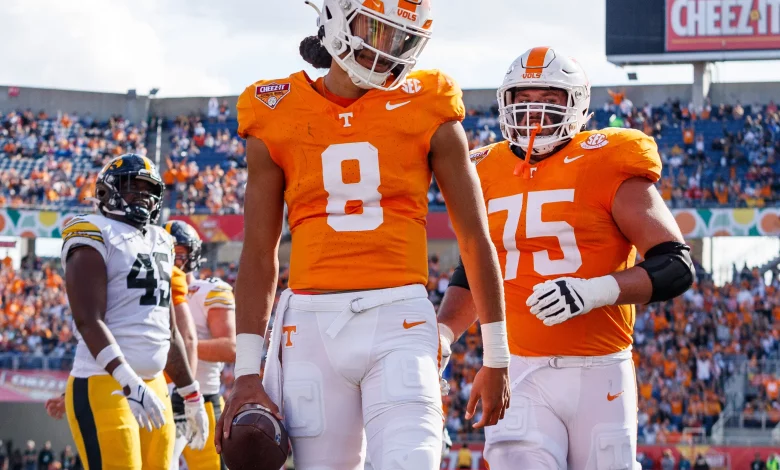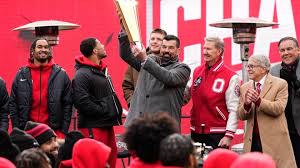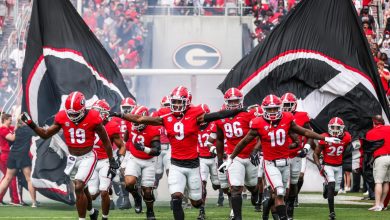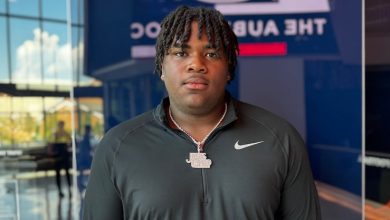Tennessee should cut ties with Nico Iamaleava to reset college football’s NIL power structure and restore competitive fairness.

The rise of NIL (Name, Image, and Likeness) rights in college athletics has dramatically reshaped the landscape of collegiate sports, especially football. College football, long dominated by the titans of tradition and powerhouse programs, has experienced a transformation where financial incentives, now legally permissible, have become an integral part of recruiting and player development. In this evolving framework, Nico Iamaleava, a highly touted quarterback who committed to the Tennessee Volunteers, represents a central figure in the controversy surrounding NIL and its impact on the sport.
Iamaleava’s recruitment was a case study in the power of NIL in today’s college football ecosystem. As one of the most coveted quarterbacks of his class, his decision to sign with Tennessee raised eyebrows for a variety of reasons—chief among them, the substantial NIL offers that accompanied his commitment. With his announcement to enter the NCAA Transfer Portal, this situation brings into sharp focus the role that NIL has played not only in Iamaleava’s personal trajectory but in the broader discussion about competitive fairness and the resetting of college football’s power structure.
This article explores why Tennessee should cut ties with Nico Iamaleava, not as a punitive measure but as a step towards recalibrating the NIL power structure in college football and restoring competitive fairness.
The Rise of NIL in College Football
The legalization of NIL rights in 2021, following the NCAA’s decision to allow athletes to profit from their name, image, and likeness, altered the trajectory of college athletics. What was once a world where players were compensated only through scholarships and stipends became one where lucrative endorsement deals, partnerships, and brand-building opportunities were on the table for college athletes. For football players, the opportunities are staggering, with deals potentially reaching millions of dollars for the most high-profile athletes.
In many respects, NIL has leveled the playing field, especially for programs that might not have the same historic appeal or pedigree as the blue-chip programs like Alabama, Ohio State, or Georgia. Schools with deep-pocketed donors, booster clubs, and innovative NIL collectives can now offer high-value deals to recruits, effectively tilting the scales in their favor during the recruiting process. For quarterbacks, the face of a football program, NIL opportunities are particularly enticing, and the case of Nico Iamaleava exemplifies the growing influence of financial incentives in player decisions.
Iamaleava’s Recruitment and the Role of NIL
Iamaleava’s recruitment as a five-star quarterback prospect became a spectacle in the world of NIL. Highly ranked by services like 247Sports and ESPN, he was seen as one of the top prospects in the country, expected to lead the future of any program he chose. As Tennessee’s coaching staff led by Josh Heupel vied for his services, the allure of the NIL money that was rumored to be attached to his commitment became an undeniable part of the narrative. Reports surfaced suggesting that Tennessee’s NIL collectives were ready to make Iamaleava one of the highest-paid freshmen in the country.
This situation illustrated the increasing importance of NIL deals in shaping player choices, as well as the way schools with the resources to pay large sums can acquire top talent. IOL (Institutional NIL), a practice of facilitating financial opportunities for athletes through third-party collectives, played a major role in Iamaleava’s decision, making his recruitment less about the school itself and more about the broader financial incentives available at Tennessee.
While Tennessee certainly deserves credit for its innovative approach to NIL, and the impact it has had on the program’s competitiveness, it also represents a broader trend where recruits and their families see college as a business opportunity, often more so than an educational or athletic one. For Iamaleava, this approach could be seen as a win—both financially and professionally—but it risks overshadowing the fundamental competitive fairness in recruiting that should be a central tenet of college athletics.
The Need to Reset College Football’s NIL Power Structure
The decision for Tennessee to part ways with Iamaleava is not about penalizing the player but rather an acknowledgment of the growing concerns over the imbalance created by NIL incentives. The current state of college football, fueled by the explosion of NIL deals, has created a situation where some programs are able to hoard talent through financial offers, thus disrupting the competitive balance that historically defined the sport.
1. Financial Inequities in Recruitment
In the current climate, schools with powerful boosters and large financial resources—often fueled by NIL collectives—can offer players compensation that smaller or less wealthy programs simply cannot. This disparity has made it increasingly difficult for programs to compete on an even playing field, undermining the core principle that college sports should be about talent, development, and competition rather than the financial resources a program can offer.
Tennessee, while certainly competitive and a historically strong program, has entered into a financial arms race with others in the Southeastern Conference (SEC) and across the nation. Programs like Texas A&M, Alabama, and USC have been able to leverage their financial strength and institutional support to bring in top-tier talent through large NIL offers. As more programs participate in this race, it is clear that the financial side of college football recruiting will become increasingly unbalanced, with the wealthier schools attracting the best players.
This situation creates an environment where college football’s recruiting landscape is no longer about just a player’s ability and potential, but rather about the financial incentives available to them. The fact that Iamaleava was able to choose Tennessee based as much on NIL incentives as the program’s success is indicative of this shift. A reset of the NIL power structure would focus less on financial leverage and more on ensuring that talented players have access to opportunities at schools that are willing to nurture their athletic and academic development, not just offer them a paycheck.
2. Restoring the Essence of College Football
College football was, and to an extent still is, a sport driven by the passion of athletes who chose to play for the love of the game, the school, and the opportunity to develop their talents. The rise of NIL has certainly given athletes the ability to profit from their name, but it has also blurred the line between amateur and professional athletics. Nico Iamaleava, while incredibly talented, made his commitment to Tennessee, in part, based on the lucrative financial deals offered to him through NIL.
By cutting ties with Iamaleava, Tennessee could send a powerful message that it is possible for college football to return to its roots. The focus should be on developing athletes as individuals, not just as revenue-generating products. The sport’s primary function is to foster competition, build team camaraderie, and contribute to the academic and athletic development of players. A reset of the NIL system would work to restore these fundamental ideals while limiting the financial influence that is gradually corrupting the spirit of college athletics.
3. Reducing the Transfer Portal Effect
One of the unintended consequences of NIL is the growth of the transfer portal, a mechanism that allows players to move freely between programs. The transfer portal has exploded in recent years, with players increasingly seeking opportunities for better NIL deals or more playing time. As a result, college football programs are no longer developing athletes for four-year careers. Instead, they are building teams on a year-to-year basis, with some players potentially leaving at any time to find more financial gain.
Iamaleava’s decision to enter the transfer portal, despite the immense amount of hype and promise surrounding him, reflects this new reality. If programs like Tennessee were to step back and limit their participation in the NIL arms race, they could help curb the growing sense of instability in college football rosters. The program could refocus its efforts on developing players who are committed to staying for the long haul and contributing to the success of the team rather than jumping ship for the highest bidder.
The Long-Term Effects of Cutting Ties
While cutting ties with a player like Nico Iamaleava would undoubtedly be a bold move, it would have far-reaching benefits for both the program and the sport as a whole. Tennessee would demonstrate that success in college football is not solely dependent on financial incentives, but on developing a winning culture, fostering team chemistry, and committing to long-term player development.
It would also serve as a model for other programs looking to reset their approach to NIL and restore fairness in the competitive structure of college football. By stepping away from the financial arms race, Tennessee could help redefine what it means to be a college football powerhouse—focusing on tradition, culture, and player development rather than NIL deals. Tennessee’s decision to cut ties with Nico Iamaleava would be a transformative moment in college football. This move could send a powerful signal to the rest of the sport about the need to recalibrate the balance between financial incentives and athletic development. It would be a step toward restoring fairness and competitive balance to college football, ensuring that programs can thrive based on their ability to develop talent, foster team dynamics, and build lasting legacies.
In the end, Nico Iamaleava’s decision to enter the transfer portal could be seen as an opportunity to reset the power structure in college football—one that is driven less by financial forces and more by a commitment to the sport’s core values. While the decision may have significant ramifications for Iamaleava’s future, it could ultimately benefit the sport by returning the focus to the players, teams, and the love of the game.









